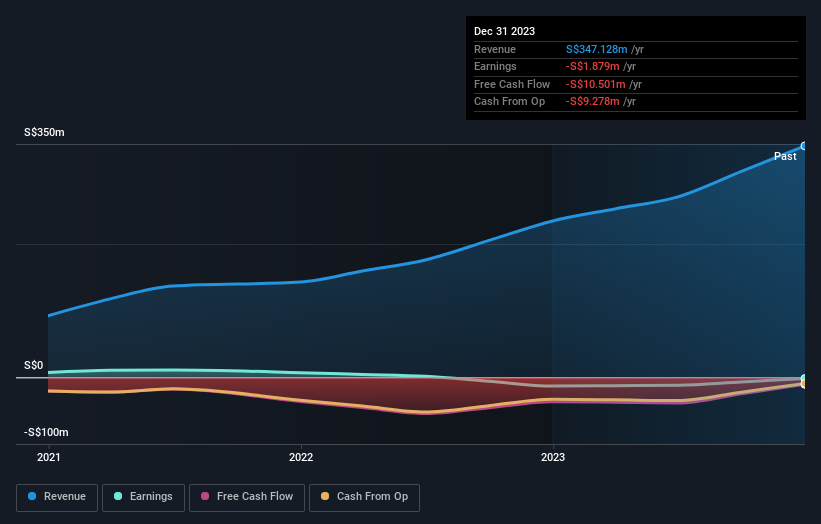Oceanus Group Limited's (SGX:579) top owners are retail investors with 56% stake, while 31% is held by private companies
Key Insights
The considerable ownership by retail investors in Oceanus Group indicates that they collectively have a greater say in management and business strategy
A total of 15 investors have a majority stake in the company with 44% ownership
To get a sense of who is truly in control of Oceanus Group Limited (SGX:579), it is important to understand the ownership structure of the business. The group holding the most number of shares in the company, around 56% to be precise, is retail investors. In other words, the group stands to gain the most (or lose the most) from their investment into the company.
Meanwhile, private companies make up 31% of the company’s shareholders.
In the chart below, we zoom in on the different ownership groups of Oceanus Group.
View our latest analysis for Oceanus Group
What Does The Lack Of Institutional Ownership Tell Us About Oceanus Group?
Small companies that are not very actively traded often lack institutional investors, but it's less common to see large companies without them.
There are many reasons why a company might not have any institutions on the share registry. It may be hard for institutions to buy large amounts of shares, if liquidity (the amount of shares traded each day) is low. If the company has not needed to raise capital, institutions might lack the opportunity to build a position. It is also possible that fund managers don't own the stock because they aren't convinced it will perform well. Oceanus Group's earnings and revenue track record (below) may not be compelling to institutional investors -- or they simply might not have looked at the business closely.
Hedge funds don't have many shares in Oceanus Group. Alacrity Investment Group Limited is currently the company's largest shareholder with 17% of shares outstanding. In comparison, the second and third largest shareholders hold about 11% and 4.0% of the stock. Heng Kang Koh, who is the second-largest shareholder, also happens to hold the title of Chief Executive Officer.
On studying our ownership data, we found that 15 of the top shareholders collectively own less than 50% of the share register, implying that no single individual has a majority interest.
While it makes sense to study institutional ownership data for a company, it also makes sense to study analyst sentiments to know which way the wind is blowing. Our information suggests that there isn't any analyst coverage of the stock, so it is probably little known.
Insider Ownership Of Oceanus Group
The definition of an insider can differ slightly between different countries, but members of the board of directors always count. Management ultimately answers to the board. However, it is not uncommon for managers to be executive board members, especially if they are a founder or the CEO.
I generally consider insider ownership to be a good thing. However, on some occasions it makes it more difficult for other shareholders to hold the board accountable for decisions.
Our most recent data indicates that insiders own a reasonable proportion of Oceanus Group Limited. It has a market capitalization of just S$231m, and insiders have S$29m worth of shares in their own names. We would say this shows alignment with shareholders, but it is worth noting that the company is still quite small; some insiders may have founded the business. You can click here to see if those insiders have been buying or selling.
General Public Ownership
The general public, mostly comprising of individual investors, collectively holds 56% of Oceanus Group shares. With this amount of ownership, retail investors can collectively play a role in decisions that affect shareholder returns, such as dividend policies and the appointment of directors. They can also exercise the power to vote on acquisitions or mergers that may not improve profitability.
Private Company Ownership
It seems that Private Companies own 31%, of the Oceanus Group stock. It might be worth looking deeper into this. If related parties, such as insiders, have an interest in one of these private companies, that should be disclosed in the annual report. Private companies may also have a strategic interest in the company.
Next Steps:
I find it very interesting to look at who exactly owns a company. But to truly gain insight, we need to consider other information, too. Case in point: We've spotted 2 warning signs for Oceanus Group you should be aware of.
Of course, you might find a fantastic investment by looking elsewhere. So take a peek at this free list of interesting companies.
NB: Figures in this article are calculated using data from the last twelve months, which refer to the 12-month period ending on the last date of the month the financial statement is dated. This may not be consistent with full year annual report figures.
Have feedback on this article? Concerned about the content? Get in touch with us directly. Alternatively, email editorial-team (at) simplywallst.com.
This article by Simply Wall St is general in nature. We provide commentary based on historical data and analyst forecasts only using an unbiased methodology and our articles are not intended to be financial advice. It does not constitute a recommendation to buy or sell any stock, and does not take account of your objectives, or your financial situation. We aim to bring you long-term focused analysis driven by fundamental data. Note that our analysis may not factor in the latest price-sensitive company announcements or qualitative material. Simply Wall St has no position in any stocks mentioned.

 雅虎香港財經
雅虎香港財經 

